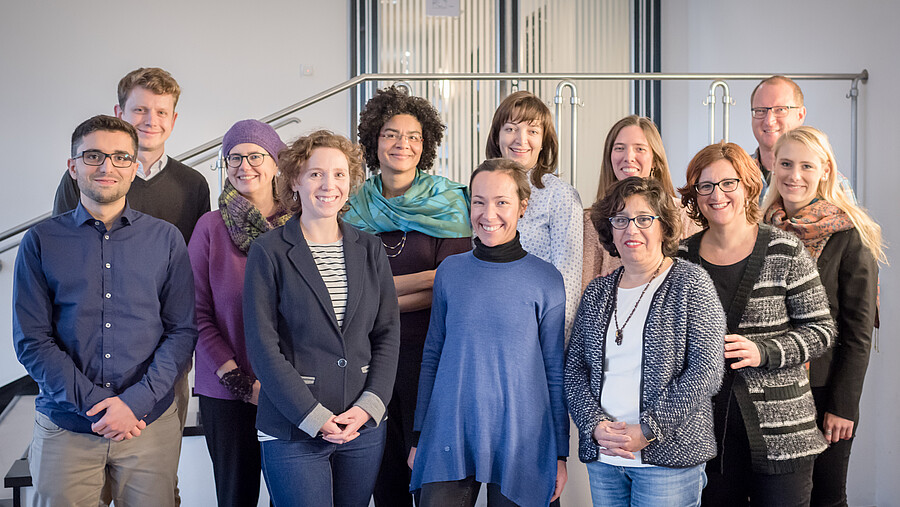Spanish Studies as subject in the Bachelor’s Teacher Training Course for Technical Education
(Bachelor of Science)
Profile
Pre-study internship (recommended).
Stay abroad possible, but not obligatory.
Short Description
Spanish is offered as a teaching subject (or supplementary teaching subject) within the bachelor's programme Technical Education. As first subject, a vocational subject must be studied. Please note the subject combination options.
The Bachelor’s degree programme in Technical Education centres around the technologies, materials and activities of a trade or industry and the teaching of these. Students are prepared for working with adolescents facing the competing interests of the requirements of companies and the expectations of society within and outside the school environment. After completing the polyvalent Bachelor’s degree, students can embark on a Master’s degree programme, the completion of which is an entry requirement for the preparatory phase of teacher training at vocational schools or for a specialist Master’s degree programme. At Leibniz Universität Hannover, the Bachelor’s degree programme in Technical Education comprises three areas: students choose one of the following vocational subject areas – Site Engineering; Plant Operations and Manufacturing of Wood Products; Colour Technology and Interior Decoration; Electrical Engineering; Metals Technology; and Food Science. In addition, they take a teaching subject and the area of Key Transferable Skills, including Vocational and Business Education, and practical training at a school. Students who select Spanish as a teaching subject acquire thorough specialist knowledge of Spanish Studies (literature and cultural sciences, linguistics and teaching methodology) at the Department of Romance Languages and Literatures.
Course Content
- Advanced Spanish language acquisition
- Advanced grammar, pronunciation and the history of language
- Language and the internet
- Literatures and cultures of Spain, Latin America and the Caribbean
- Literature and film (e.g. telenovelas)
- Options for periods abroad
- Reflection on the teaching and learning of foreign languages
Students who take Spanish as a teaching subject first take basic modules in which they learn the key skills and knowledge required for further study. These are followed by advanced seminars (advanced modules) in which the skills and knowledge gained are expanded on and developed. During language practice courses, students gradually improve the language level they had before starting university. After a year or so, they start learning about teaching methodology, i.e. the teaching and learning of foreign languages in school-based contexts. They gain fundamental insights into literature and cultural sciences as well as linguistics.
| Semester | 1 | 2 | 3 | 4 |
|---|---|---|---|---|
Compulsory modules | Basic module Language Practice (1) | Basic module Language Practice (2) | Advanced module Language Practice (1) Basic module Literary Studies OR Basic module Linguistics Basic module Teaching Spanish | Advanced module Language Practice (2) Basic module Literary Studies OR Basic module Linguistics |
- Enjoyment of and a talent for languages
- Enjoyment of reading
- Capacity for teamwork and the desire to communicate
- Openness towards other cultures
- Ability to work independently
- Good written expression
- teacher at vocational schools (following completion of the postgraduate Master’s degree programm)
- Tourism, travel and the hospitality industry
- Press, film, PR
- Non-school-based teaching
- Master’s Teacher Training Course for Technical Education (Master of Education)
- Spanish Studies as subject in the Master’s Teacher Training Course for Technical Education (Master of Education)
Under certain conditions, admission to the following Master''s programme is also possible. More detailed information can be found in the respective admission regulations. If you have any questions, please contact the course advice of the desired Master''s programme:
Admission Requirements
Some subjects in the Bachelor Teacher Training Course for Technical Education are restricted: Computer Science, English Studies (school subject: English), Food Science, German Studies (school subject: German), Politics and Sports.
Some subjects in the Bachelor Teacher Training Course for Technical Education are admission-free: Catholic Religious Education, Chemistry, Colour Technology and Interior Decoration, Electrical Engineering, Mathematics, Metals Technology, Physics, Plant Operations and Manufacturing of Wood Products, Protestant Religious Education, Spanish Studies and Site Engineering.
The exact admission requirements can be found in the admission regulations:
Application Deadlines
For a subject combination with at least one subject with restricted admission:
01.06.-15.07. of the year for the winter semester
- First-year students (application for the 1st semester) can only apply for the winter semester.
- Those continuing their studies (application for higher semesters) can also apply for the summer semester (December 1st - January 15th).
For a subject combination with two admission-free subjects:
01.06.-30.09. of the year for the winter semester
- First-year students (application for the 1st semester) can only enrol in the winter semester.
- Students resuming their studies and transfer students (application for higher semesters) can also enrol in the summer semester (December 1st - March 31st).
The following applies to applications from non-EU countries:
- VPD from uni-assist OR a passed assessment test (Feststellungsprüfung) of a preparatory foundation course (Studienkolleg) is required.
- Applications for the Studienkolleg must be submitted by July 15th.
Do you have questions about studying? We are happy to help!

30167 Hannover

30167 Hannover









